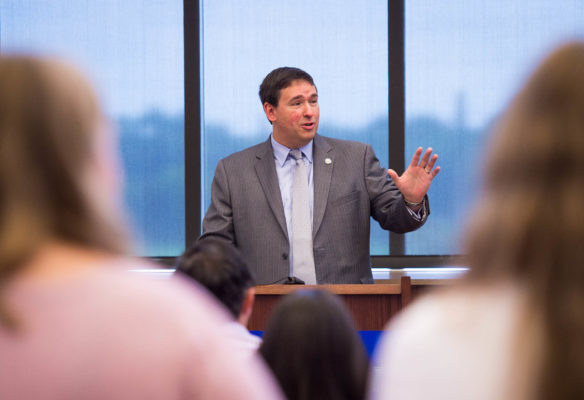
Commissioner Stephen Pruitt speaks during a press conference at Glasgow High School (Glasgow Independent) announcing the start of a new initiative to expand computer science opportunities for students in Kentucky. As part of the initiative, KDE and its partners are working with 33 school districts and seven Area Technology Centers this year to provide student access to expanded computer science learning opportunities.
Photo by Bobby Ellis, Aug. 22, 2017
(FRANKFORT, Ky.) – Kentucky Commissioner of Education Stephen Pruitt, state and national partners from AdvanceKentucky, the College Board, Code.org and Kentucky Sen. David Givens gathered Aug. 22 at Glasgow High School (Glasgow Independent) to announce a new computer science initiative that will expand computer science learning opportunities for Kentucky public school students.
“The United States currently has more than 494,000 unfilled computing jobs, but only 43,000 computer science graduates to fill those jobs,” Pruitt said. “By creating more opportunities for computer science learning, we will reach, keep and engage more students in learning, create a pool of more qualified people to fill existing job openings and stimulate suppressed economic regions of our state by developing a high-tech, skilled workforce.”
The initiative also will involve the development of state-based computer science standards, student industry certifications, and professional development opportunities to encourage math, science and career and technical education (CTE)-credentialed teachers to attain computer science credentials. In addition, the Kentucky Department of Education (KDE) will count a computer science credit as either a standalone requirement or as credit that can substitute for a science credit for high school graduation.
During the announcement, Sen. David Givens – a long-standing champion of increased computer literacy and one of the first voices in the state to call for increased and advanced computer science learning opportunities for students – spoke about the importance of Kentucky students having access to quality computer science instruction.
“Computer science and coding utilize critical thinking and problem-solving talents that benefit all career paths,” Givens said. “I am excited this initiative will broaden access to these critical skills for our Kentucky students.”
Goals for the computer science initiative include:
- establishing a continuum of computer science education and student competencies from elementary to high school;
- providing more opportunities for computer science learning for ALL students – especially students typically under-represented in rigorous high school courses – to engage in advanced coursework that will prepare them for future success; and
- preparing students to address a critical workforce need related to computer science knowledge and skills.
“Information technology jobs are abundant in Kentucky, and building a pipeline of students with an interest and knowledge of that field is critical in our efforts to improve the Commonwealth’s workforce,” Kentucky Education and Workforce Development Secretary Hal Heiner said. “Jobs in the computer science and information technology field pay very well, and in many cases do not require a 4-year or even a 2-year college degree.”
As part of the initiative, KDE and its partners are working with 33 school districts and seven Area Technology Centers this year to provide student access to expanded computer science learning opportunities.
Code.org is working with its local partner AdvanceKentucky to prepare 50 teachers each year for three years to expand student opportunities to the AP Computer Science Principles (AP CSP) course; as well as expanding preparation for its middle school course, Computer Science Discoveries; and its elementary school course, Computer Science Fundamentals.

Adam Garrett, left, and Garrison Page, students in the AP Computer Science Principles class at Glasgow High School, log onto a website used to teach students coding. A new initiative in Kentucky will expand students’ computer science opportunities, which includes a plan to offer the popular new AP Computer Science Principles course in at least 150 additional high schools.
Photo by Bobby Ellis, Aug. 22, 2017
“It’s never too early to start exposing students to and developing competencies in coding and computer science,” Cameron Wilson, chief operating officer for Code.org said. “This initiative will introduce an awareness of computer science at the elementary level, exploration of computer science in middle school and afford more students to take Advanced Placement Computer Science Principles at the high school level.”
The partners plan to offer the popular new AP Computer Science Principles course in at least 150 additional high schools. AP CSP teaches students the foundational concepts of computer science and challenges them to explore how computing and technology can impact the world. The course provides a unique focus on creative problem-solving and real-world applications and can lead to a future in 130 college areas and 48 college majors.
“An education in computer science and coding — the tools with which the future is being built — has been out of reach for too many students. With AP Computer Science Principles we’ve changed the invitation to help all students discover how computing and technology shape the world around them,” said Trevor Packer, the College Board’s senior vice president of Advanced Placement and Instruction. “The College Board is proud to partner with the Kentucky Department of Education, Advance Kentucky, and Code.org to bring AP Computer Science Principles to students in every corner of the Commonwealth.”
AP CSP may count as an elective, a fourth mathematics course, and could meet a science requirement for high school graduation. Also, the course counts toward a career and technical education computer science pathway and may earn a student college credit if he or she earns a qualifying score on the associated AP exam.
“As part of this initiative, we are especially interested in targeting students who are traditionally under-represented in Advanced Placement courses,” said Monique Morton Rice, senior content director for AdvanceKentucky said. “Since 2008, AdvanceKentucky has shown with its model, which includes extensive teacher training and student supports, all students can succeed in and greatly benefit from rigorous Advanced Placement coursework.”
As part of the initiative, KDE and its partners will advocate for legislative funding to continue professional development for computer science education, aligned requirements for higher education admission and high school graduation to ensure that computer science credits have value to students as both a high school math or science graduation requirement and as credit toward higher education admission, and the adoption of computer science as a statewide general education requirement within Kentucky’s postsecondary system.
To participate in the computer science initiative, districts had to develop and implement a plan for sustaining a computer science program beyond the initial implementation year that reaches more students and offers additional opportunities for students to explore computer science. In exchange, selected districts received:
- professional learning experiences for elementary, middle and high school teachers;
- access to courses/instructional materials at all levels, including AP Computer Science Principles;
- stipends for teachers for summer learning experiences;
- access to mentors/networks of other computer science teachers; and
- funds to cover AP Computer Science Principles student exams during the first year of course implementation.
Kentucky Computer Science Initiative 2017-18 Participating Districts/Schools
| Anderson Co. | Grant Co. |
| Barbourville Independent | Harrison Co. |
| Barren Co. | Jefferson Co. (Brandeis Elementary) |
| Bowling Green Independent | Lincoln Co. |
| Boyd Co. | Madison Co. |
| Breathitt Co. | Magoffin Co. |
| Bullitt Co. | Marshall Co. |
| Burgin Independent | Mason Co. |
| Christian Co. | Model Laboratory School (EKU) |
| Clay Co. | Murray Independent |
| Clinton Co. | Owsley Co. |
| Erlanger-Elsmere | Pike Co. |
| Fayette Co. | Scott Co. |
| Fleming Co. | Taylor Co. |
| Floyd Co. | Union Co. |
| Franklin Co. | Wayne Co. |
| Glasgow Independent | |
| Area Technology Centers | |
| Campbell Co. ATC | Martin Co. ATC |
| Clinton Co. ATC | Russell ATC |
| Hughes Jones- Harrodsburg ATC | Warren Co. ATC |
| Marion Co. ATC |
The Kentucky Department of Education will be taking applications for additional districts to join the computer science initiative in spring 2018 and spring 2019.




Leave A Comment